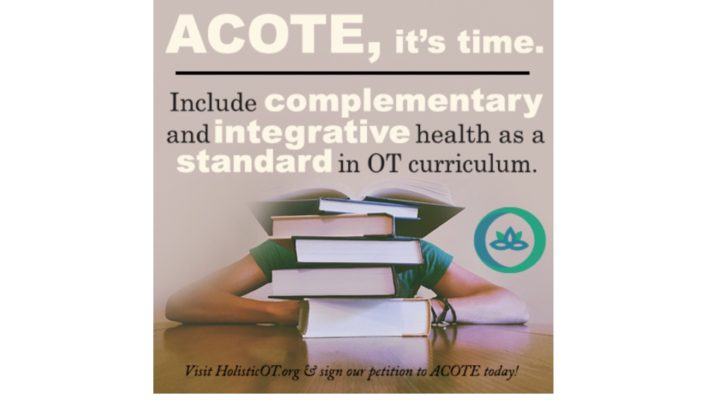
You Can Help! Sign this Petition for the Accreditation Council for Occupational Therapy Education (ACOTE) to Include Complementary & Integrative Health as an OT Curriculum Standard
Would you like Complementary and Integrative Health to become standard in OT education curricula in the United States? Sign the letter below in the comment section with your name and credentials and any additional comments by August 31, 2016! (You need to scroll down past all the other signatures to sign in the “Leave your reply” section.)
The Education Standard Review Committee will be meeting this September to decide what is taught in OT school curricula across the United States. Have your voice heard by urging them to include these important topics for the OT profession to be current and maintain relevance in the changing health care landscape.
Emmy Vadnais, OTR/L will send the letter with your name and comments to Heather Stagliano, DHSc, OTR, Director of Accreditation at the American Occupational Therapy Association, who will then forward it to the ACOTE Education Standard Review Committee.
Your name and comments will make an impact! Thank you for taking this important step for the OT profession!
*******
Dear Occupational Therapy Education Standard Review Committee:
I am an occupational therapist, student OT or retired OT. I believe it is necessary that Complementary and Integrative Health be taught as a core standard in the OT curriculum. Occupational Therapy is distinctly able to integrate these approaches into their practice per the Complementary and Alternative Medicine position paper from AOTA, 2011:
The American Occupational Therapy Association (AOTA) asserts that complementary and alternative medicine (CAM) may be used responsibly by occupational therapists and occupational therapy assistants as part of a comprehensive approach to enhance engagement in occupation by people, organizations, and populations to promote their health and participation in life (AOTA, 2005; Giese, Parker, Lech-Boura, Burkhardt, & Cook, 2003).
The use of Complementary and Integrative Health is increasing in OT practice and all of health care. The public’s use of and desire for these services is increasing. It is estimated by the National Center for Complementary and Integrative Health that 34% of adults and 12% of children use these approaches, and they are more frequently used by individuals with chronic conditions and functional limitations (https://nccih.nih.gov/research/statistics/NHIS).
OT education standards may need to include these topics to prepare students for these changes in health care and for the OT profession to remain current and relevant. It is important that OTs have a foundational knowledge in these approaches, because knowledge of Complementary and Integrative Health is pertinent to best practice as OTs. We have an ethical obligation to learn about these approaches, apply them in clinical practice, or refer when appropriate.
OTs are increasingly becoming educated in and are providing Complementary and Integrative Health in their OT practices, and clients are seeking out these services. In addition, there is an emphasis placed by our new president of AOTA, Amy Jo Lamb, to provide prevention and wellness, and these approaches can significantly help in this area.
CAM is not so alternative anymore. The National Center for Complementary and Integrative Heath changed its name last year and removed the word “alternative” from its former title “The National Center for Complementary and Alternative Medicine.” There is growing research demonstrating its efficacy and Mayo Clinic encourages its patients to seek out these approaches.
OT already brings a holistic perspective to the profession, and many students would like to see Complementary and Integrative Health taught in their program. Several OT students have their own current self-care practice of yoga, meditation, and other approaches, and they would like to learn how they can provide this to their clients through the OT scope practice.
These approaches are becomingly increasingly integrated into health care. Over 60% of medical schools are teaching this as part of their core training or as electives (http://www.ncbi.nlm.nih.gov/pubmed/9729989, http://www.ncbi.nlm.nih.gov/pmc/articles/PMC4334197/).There are specialties in other health care professions. There are Integrative Medicine Physicians, Holistic Medical Doctors, and Holistic Nurse Clinicians. It will likely continue to grow and may eventually simply become healthcare.
These approaches dovetail beautifully with the already holistic way OTs address their clients. Currently practicing OTs are billing for these approaches as part of a comprehensive OT treatment plan and are receiving reimbursement.
Adding education about this aspect of health care will provide necessary skills OTs need to keep current within the changing landscape of the health care system, and will add to our distinct value as OTs making occupational therapy relevant now and for the future.
I hope to see Complementary and Integrative Health taught in the core curriculum in OT schools so that occupational therapists can gain professional knowledge and skills on how Complementary and Integrative Health can be utilized to promote occupation.
Thank you very much for your consideration.
Sincerely,
Emmy Vadnais, OTR/L
Please see attached names and comments below:
*******





Leave your comment to Cancel Reply